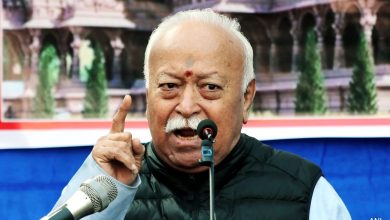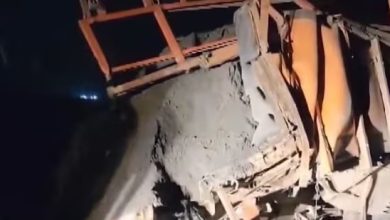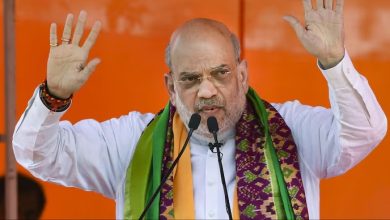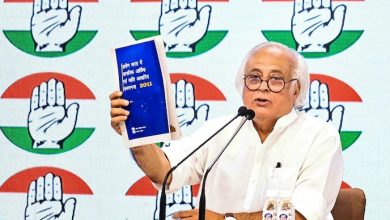
New Delhi. The Supreme Court’s order on Thursday, in effect telling the Punjab government that it was legally bound to share the waters of Ravi-Beas rivers with Haryana and others, and that it could not unilaterally decide to scrap the construction of the Sutlej-Yamuna Link canal (SYL canal), threw the poll-bound state into political turmoil.
Minutes after the apex court’s order, all Congress MLAs of the state resigned their Assembly seats, and Congress state president Captain Amarinder Singh resigned from his Lok Sabha seat.
Captain Amarinder’s letter to the Lok Sabha Speaker said that he was resigning “as a mark of protest against the deprivation of the people of my state of the much-needed Sutlej river water”.
The ruling Shiromani Akali Dal’s reaction came in the evening. Punjab chief minister Parkash Singh Badal, who had called an emergency meeting of the Cabinet at his residence, declared that not a single drop of water from Punjab’s rivers would be allowed to go out of the state, and that the Punjab government would not allow the SYL to be built at any cost.
“Water is the life line of every citizen of Punjab, especially farmers, industry and trade. Nobody can take away our citizens’ lifeline,” a minister said, and added, “Not a single brick would be allowed to be laid for its (SYL canal) construction by any agency.”
The Cabinet has called an emergency session of the Punjab Vidhan Sabha on November 16 to discuss the issue.
Also jumping into the fray was the Aam Aadmi Party, which held both the Congress and SAD responsible for the order against Punjab and announced that it would lay an indefinite “morcha” at Kapoor Village (origin of SYL canal) Friday onwards.
Both the SAD and the AAP termed the resignation of PPCC chief Captain Amarinder Singh as a “political drama”.
The Cabinet, in fact, held Captain Amarinder responsible for inviting Mrs Indira Gandhi to start the digging of the canal at Kapuri in his constituency, Patiala. They said that it was the SAD which had launched a long, peaceful, democratic morcha against this digging, and that it’s the result of their efforts that no river waters went out of Punjab after that.
The Supreme Court on Thursday morning declared as unconstitutional a law enacted by Punjab overwriting all inter-state water sharing accords and enabling return of over 5,000 acres of land acquired from farmers for the SYL canal.
A constitution bench of the court ruled that Punjab cannot take “unilateral” decision to terminate the agreement with Haryana, Himachal Pradesh, Rajasthan, Jammu and Kashmir, Delhi and Chandigarh to share of the Ravi-Beas river waters.
The court also ruled that the SYL canal, which is at the centre of the row between Punjab and Haryana, has to be completed, and that the land acquired for the canal will not be returned to farmers.
A five-judge Constitution Bench pronounced the judgment on a presidential reference on the validity of the 2004 law — Punjab Termination of Agreements Act — under which Punjab had sought to ease out of its liability to share the waters of Ravi, Beas and Sutlej.
Holding that the Punjab Termination of Agreement Act, 2004, was not in conformity with the provisions of the Constitution, the court answered in the negative all the four questions referred to it in a presidential reference.
The questions in the presidential reference were:
1. Whether the 2004 Act in accordance with the Constitution.
2. Whether the 2004 law is in accordance with the Inter State Water Disputes Act and the Punjab Re-organisation Act of 1966, in which Haryana was carved out of Punjab.
3. Did Punjab validly terminate the agreement of December 31, 1981 and other agreements concerning the Ravi-Beas waters.
4. Whether Punjab is discharged of its water-sharing obligations to Haryana flowing from separate Supreme Court verdicts on January 15, 2002 and June 4, 2004.
Haryana had revived the long-pending Reference after the Punjab Cabinet gave the green signal for tabling the Punjab Sutlej Yamuna Link Canal (Rehabilitation and Re-vesting of Proprietary Rights) Bill, 2016, in the Assembly. The Bill did not become law as governor had not give his assent.
Haryana had argued in court that while the 2004 Act was intended to defeat two Supreme Court judgments ordering Punjab to construct the canal on its territory, the new Bill was aimed at rendering the current reference infructuous. Haryana had argued that “it is the duty of this court to maintain the integrity of the federal structure” to stop Punjab.
“You have to strike a balance between the states, large and small, powerful and weak, upstream or downstream. If you allow them to trump over your jurisdiction by successively legislating away, your powers, considered a linchpin in the Constitution, will lie denuded,” senior advocate Shyam Diwan, appearing for Haryana, had argued.
The Constitution Bench said the Punjab Act violated the provisions of the Constitution as well as the basic principles and tenets concerning federalism and rule of law.
It added that the agreement cannot be terminated unilaterally by one party and if any state does so, it’s contrary to the Constitution as well as the provisions of the Inter State Water Disputes Act, 1956.
The bench said Punjab cannot absolve itself from its duties/liabilities arising out of the 1981 Agreement.
“Punjab had exceeded its legislative power in proceeding to nullify the decree of this Court and therefore, the Punjab Act cannot be said to be a validly enacted legislation,” the bench said, rejecting Punjab’s submission that the court should not answer the 2004 reference as much water had flown since then. The bench said Article 143 of the Constitution does not restrict the President to obtain opinion only on a question of law. “This is not a case where this court would like to refuse to give its opinion to the President under the provisions of Article 143 of the Constitution as there is no good reason for the same,” the bench said.





